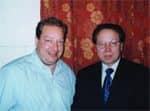March 10, 2008
WASHINGTON, DC — Experts estimate that genetic factors cause 50-60% of severe to profound childhood hearing loss in developed countries. Most DNA is found in the cell nucleus, but DNA can also be found in the mitochondria, the energy-generating structures inside cells. Mitochondrial DNA carries genes that have been linked to hearing loss, heart disease, nerve damage, and epilepsy. Unlike DNA in the nucleus, which is inherited from both parents, mitochondrial DNA is passed only from mother to child.
Advance
NIDCD scientists have demonstrated that a particular mutation in mitochondrial DNA causes deafness. Their findings are based on a study of a large North American family with maternally inherited deafness and is published in the January 2008 issue of Clinical Genetics.
Earlier studies had identified two large, unrelated families exhibiting many cases of progressive deafness that had been passed to the next generation exclusively by the mother. Both of these families had a rare mutation in a gene, called tRNASer(UCN), located on the mitochondrial DNA. Scientists identified the specific mutation as 7510T>C, but they could not be confident that it was responsible for the families’ deafness.
More recently, NIDCD-supported scientists identified a third large family with hereditary deafness passed to children only by the mother. To explore the genetic cause of this family’s deafness, NIDCD scientists and other National Institutes of Health (NIH) colleagues collaborated with researchers at the Center for Biomedical Research on Rare Diseases in Madrid, and Virginia Commonwealth University in Richmond. The team sequenced the mitochondrial DNA of 5 members of the newly identified North American family, 3 with hearing loss and 2 without. They found 13 variations in the mitochondrial DNA. A total of 12 variations were found in all members of the family and are known to be common changes in mitochondrial DNA (called polymorphisms). One mutation was only found in family members with hearing loss. It was the same 7510T>C mutation as that found in the tRNASer(UCN) gene of the other two families.
However, the team knew that this information did not prove that the mutation caused hearing loss. To confirm the role of this mutation in causing the hearing loss, scientists analyzed the mitochondrial DNA from 200 unrelated individuals without hearing loss. A total of 78 of these individuals had 11 of the same polymorphisms as the North American family and one individual had 12 of the same polymorphisms. These shared variations indicated the individuals have the same mitochondrial DNA “fingerprint,” known as a haplogroup—but none of these individuals had the 7510T>C mutation.
Furthermore, a Spanish family with maternally inherited deafness and the 7510T>C mutation had a different mitochondrial DNA haplogroup. Their results indicated that 7510T>C is not a coincidental variant associated with one particular haplogroup. The research team concluded that their data “provide strong genetic evidence” that the 7510T>C mutation causes deafness.
Implications
These results will improve the genetic counseling of individuals with hearing loss after genetic testing. The mutated gene also provides researchers with clues that, with further research, could lead to drugs for treating deafness.
Citations
Labay V, Garrido G, Madeo AC, Nance WE, Friedman TB, Friedman PL, del Castillo I, and Griffith AJ. Haplogroup analysis supports a pathogenic role for the 7510T>C mutation of mitochondrial tRNASer(UCN) in sensorineural hearing loss. Clinical Genetics 2008;73(1):50-54.
Morton CC and Nance WE. Newborn hearing screening—a silent revolution. New Eng J Med. 2006;354(20):2151-2164.
Source: NIDCD




